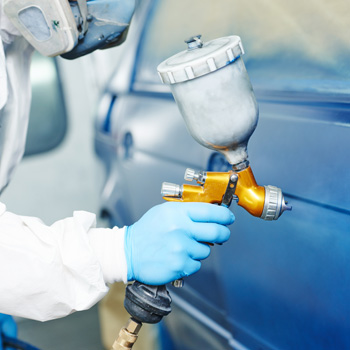Solvents are commonly found in everyday items like cleaning agents, glues, paint thinners, detergents, and furniture polishes. Often labeled as toluene, xylene, acetone, or ethyl acetate, these chemicals play a role in dissolving other components within the product before evaporating once applied. While occasional use might not pose immediate danger, activities such as spray painting vehicles can lead to prolonged and intense exposure, with both short- and long-term health consequences. Also referred to as VOCs, solvents don’t behave like water—they don’t just evaporate; instead, they release harmful toxins into the air. People working regularly with these substances may experience mild symptoms like dizziness when exposed, which is due to soft tissue damage affecting the brain and nervous system. Over time, this damage accumulates, possibly leading to chronic toxic encephalopathy, characterized by memory loss and reduced motor skills. Additionally, workers frequently exposed to solvents face heightened risks of liver, kidney, and respiratory problems, skin conditions like dermatitis, and even increased chances of developing cancer. Recent studies from the Harvard School of Public Health highlight the lasting impacts of repeated solvent exposure. Cognitive issues related to this exposure might not show up until decades later—anywhere from 30 to 50 years post-exposure! Researchers noted that higher levels of exposure corresponded with more significant declines in cognitive abilities, particularly affecting attention span, processing speed, and memory recall. Surprisingly, common household items such as adhesives, epoxy, and asphalt contain these chemicals. Typically, people encounter solvents through breathing them in, but skin contact or accidental ingestion without proper protection can also occur, increasing the risk of overexposure. Here's what could happen: Furthermore, research from the Endocrine Disruption Exchange (TEDX) and the University of Colorado, Boulder suggests that even low-level, repeated solvent exposure can disrupt the body’s hormonal balance. This disruption may contribute to issues like lower birth rates, premature births, altered sperm counts, and cardiovascular problems in infants. When combined with nitrogen oxides, VOCs react under sunlight and warm conditions to produce ground-level ozone. At high concentrations, this substance can harm vegetation, wildlife, agricultural yields, and construction materials. Modern waste management practices now discourage—or even ban—the discharge of solvents into the environment. However, for many years, businesses were unaware of the dangers and simply poured solvents into the ground, believing they would evaporate. Unfortunately, the soil absorbed these chemicals, contaminating the groundwater, particularly in areas with shallow soil layers. As a result, unsuspecting individuals are exposed to solvents through their drinking water, cooking, showering, or swimming in public pools. Moreover, solvents can seep into building foundations and underground infrastructure like plumbing and electrical systems, causing slow but steady damage. They may even infiltrate a structure’s indoor air through a process called vapor intrusion. To address these concerns, DaSilva’s Auto Body provides eco-friendly services, utilizing low-VOC paints and responsibly disposing of all materials used during repairs. If you're interested in learning more or scheduling an appointment, feel free to reach out to our Naugatuck location today! Animal Vitamin Tablets,Veterinary Oral Vitamin Pills,Oral Vitamin Tablets For Veterinary Use,Animal Nutrition Supplement Tablets Henan ShowVet Industrial Co., Ltd. , https://www.cxbt-showvet.com In recent years, we’ve become increasingly aware of the potential risks associated with solvents, those chemicals that help dissolve other substances to create a solution. For instance, DaSilva’s Auto Body, along with numerous other shops in the industry, has taken steps to reduce or eliminate the use of paints containing volatile organic compounds (VOCs).
In recent years, we’ve become increasingly aware of the potential risks associated with solvents, those chemicals that help dissolve other substances to create a solution. For instance, DaSilva’s Auto Body, along with numerous other shops in the industry, has taken steps to reduce or eliminate the use of paints containing volatile organic compounds (VOCs).The Risks of Solvent Exposure
Frequent Encounters with Solvents
Environmental Impact
How Harmful Are Paint Solvents?
Veterinary Vitamin Tablets are crucial in supporting the health and well-being of animals by ensuring they receive essential nutrients that may be lacking in their regular diet. These supplements come in various forms, including Animal Vitamin Tablets, which are designed to address specific nutritional needs and deficiencies. Veterinary Oral Vitamin Pills are another form of these supplements, providing a convenient way to deliver vital vitamins directly into the animal’s system. Oral Vitamin Tablets For Veterinary Use are particularly important for managing conditions that require targeted nutritional support or for enhancing overall health and vitality. Additionally, Animal Nutrition Supplement Tablets are formulated to complement the animal’s diet, offering a balanced approach to nutrition that supports growth, immune function, and overall health. Together, these vitamin tablets play a significant role in maintaining optimal health for animals, helping to prevent deficiencies and ensuring that they receive the nutrients necessary for a healthy, active life.
If you need it, we can customize exclusive formulas, packaging, and everything you want for you. If you need a product manual, please contact us. Thank you.